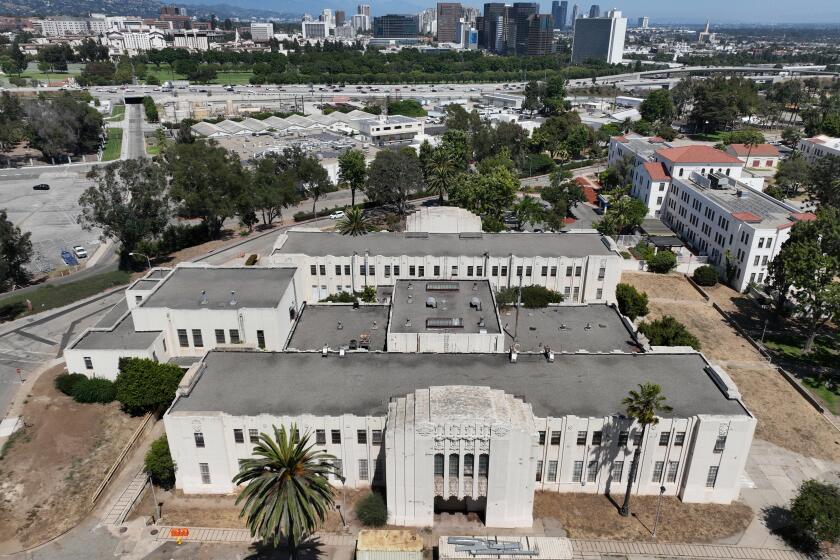They’re not alone on blvd. of broken meters
A couple of years ago, Los Angeles resident Jan Gabrielson met a friend for breakfast at Junior’s in West Los Angeles.
Gabrielson’s pal parked at a meter on Westwood Boulevard, but the meter was broken. Conveniently, a parking officer drove up.
“We asked him what to do,” Gabrielson recalled. “He said they do not cite at broken meters until after two hours has passed, even if the meter resets itself.”
So, Gabrielson and his friend went merrily on their way, and anyone who has been reading about Metergate in this space in recent weeks knows exactly what happened next.
*
How long did it take the city to issue a parking ticket?
It was less than an hour before a second officer happened along and wrote a ticket for parking at an expired meter.
There are a couple of lessons here. One, do not park at broken meters. Two, as any fan of “Star Wars” can tell you, parking officers are much like Dark Lords of the Sith -- they often travel in pairs.
Another outstanding tale of parking meter outrage comes from reader Mike Cline. He recently parked at a meter in Venice and set his watch to beep five minutes before time was to have expired. His watch chirped, and Cline returned to the car to find that he had received a ticket for parking at an expired meter. Cline believes his watch tells time better than the meter.
“When I sent a letter to appeal the typically ridiculous fine, the Orwellian reply was that my appeal was denied because there had been no reports of faulty operation of that meter,” Cline wrote. “Apparently, my report didn’t count.”
*
Is the city trying to make the appeals process difficult to wear down residents?
If so, no one is saying it. But let’s consider the bigger picture.
Over the past two decades, Los Angeles and many other cities nationwide have seen a marked increase in the amount of money raised by parking fines, according to a 2004 report by the National League of Cities.
In Los Angeles, the city was collecting about $75 million annually in parking fines in the late 1990s. In fiscal year 2005-06, with the price of tickets having since gone up, the amount was $113 million, or 1.9% of the city’s total annual revenue.
That’s about the same amount generated by parking tickets in the previous two years. In addition, the city says that motorists have failed to pay the city $156 million in outstanding tickets over the past three years.
*
Who actually collects the money?
City employees issue parking tickets, but the city last year signed a five-year contract with a vendor named Affiliated Computer Services to run the Parking Violations Bureau for $9 million to $10 million per year.
As part of the deal, ACS is paid between $1.49 and $2.78 per ticket they process, whether or not those tickets are successfully appealed.
Theoretically, that removes the incentive to deny all appeals. On the other hand, a cynic may suggest that all such firms -- in Los Angeles and elsewhere -- ultimately are judged by how much revenue they collect for the cities that hire them.
The question, then, is how often are appeals granted?
The Times submitted a request to the city’s Department of Transportation for data showing how many appeals are granted. Agency officials say they’re working on it.
Robert Andalon, a chief management analyst for the department, said he understands the process may frustrate some people. “But it still behooves the individual to contest the ticket and give us the opportunity to do research on the meter,” Andalon said. “We want to do right by the people.”
His advice is always to report a broken meter and to promptly request a review, as the city keeps records of broken meters and can also test to see whether one is working.
In the meantime, it is fair to say that many readers believe the system is rigged to make it virtually impossible to prove your innocence.
Jim Rhyne of Eagle Rock told about the time in 2004 he put a dime in the meter for 24 minutes of time on Colorado Boulevard. He browsed a store for five minutes and returned to find a $35 ticket for an expired meter, despite the 20 minutes remaining on the meter.
Rhyne drove home, fetched his camera and returned to take a photo of the meter showing eight minutes left. But his appeal was denied because he couldn’t prove he was telling the truth or that the photo wasn’t altered.
More in coming weeks.
*
What did the owner of Los Angeles’ only historic trailer park want to do with the land?
Sell it for condos.
But the Monterey Trailer Park is safe for now.
The back story: The trailer park is in the Los Angeles community of Hermon, tucked into a leafy hillside between the Arroyo Seco and the Monterey Hills.
Back in the 1920s and ‘30s, the trailer park was the site of an old auto camp, where migrants tooling into town on Route 66 would pull over and set up a tent while searching for a new home. In 2002, the City Council declared the park a historic landmark.
Francis Tang of Temple City bought the park in 2003 and in 2005 applied for a property-tax discount under the state Mills Act, which is intended to help owners preserve historic sites.
Then, last year, Tang put the property on the market for $2.5 million. “Monterey Mobile Home Park offers an investor/developer the opportunity to re-zone and redevelop into a high-rise condominium project,” read the real estate ad.
Today, the trailer park is home to 22 residents, and looks like it hasn’t changed much since the 1960s.
Only a handful of the old buildings remain, but many of the residents have been there for decades, and many are under the city’s rent-control program.
“My boss teases me about being trailer trash, but it’s quiet here, I like my neighbors and we’re like a family,” said Kathleen Osmon, 70, who has lived in the park since 1981. “And it gives me some pride to live somewhere that is part of the city’s history.”
On Tuesday, the real estate agent for Tang told The Times the property had been pulled off the market because the historic preservation issues made it a difficult sell and that Tang intended to leave it as is even though the rent control is hurting him.
Tang could not be reached for comment.
Wendi Riser, a neighborhood activist, said she knows that not every community fights to save its local trailer park. Often, it’s quite the opposite. But, she said, that’s Hermon.
“We’re a community -- a little one -- and that trailer park is part of us, and they are one of the lovely quirky things that makes Hermon special,” Riser said. “We value our history, and that trailer park is part of it.”
*
Any news on the Rose Parade front?
Last week we told readers we’ll run their ideas for Los Angeles’ Rose Parade float in April.
We’re changing that to Feb. 5, as we’ve since learned that drafts of float designs are due at the Tournament of Roses offices by mid-February.
A few good ideas have trickled in. So has a profoundly indelicate one. To the City Hall employee who shall remain nameless: Perhaps the Rose Parade isn’t the best forum to portray the porn industry’s contributions to Los Angeles.
Next week: Is MacArthur Park the next Paris?
*
More to Read
Sign up for Essential California
The most important California stories and recommendations in your inbox every morning.
You may occasionally receive promotional content from the Los Angeles Times.










